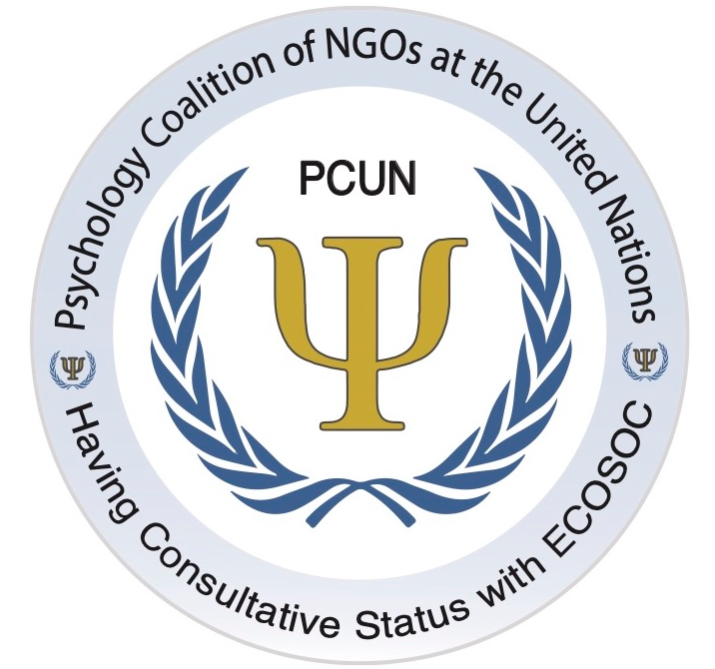Advocacy by the Psychology Coalition of Accredited NGOs at the UN during the Inter-Governmental Negotiations that Established the 2030 Sustainable Development Agenda
March 10, 2016
During the 2013-2015 Inter-Governmental Negotiations to develop the 2030 SDGs, PCUN led advocacy campaigns with government missions at the UN, urging them to integrate psychological perspectives on mental health and the elimination of racial discrimination into the SDGs framework. The process of the inter-governmental negotiations was extremely challenging, requiring the development of various advocacy statements, contacting representatives of government missions to gain their support, and arranging meetings with them to plan strategies.
Mental Health and Well-Being
“Mental health” commonly applies to serious conditions like clinical depression, schizophrenia or organic brain syndromes. However, the population of every country suffers from more widespread emotional distress as a concomitant to, and result of, poverty, inadequate living standards, violations of human rights, lack of decent work, natural disasters and other conditions. Vast numbers of the population with “less clinically serious” or diagnosed conditions are suffering emotionally, but are not recognized or treated. This results in both extensive human and economic costs to nations. Moreover, in many countries, stigma against mental illness or lack of recognition of the importance of what can be considered milder stress-related debilitating conditions may result in people seeking help that is inadequate and to being abused by or ostracized from families and communities.
PCUN was successful in getting Ambassador Otto of the Mission of Palau to the UN to head up our Mental Health Campaign consisting of a large group of missions under the title of “Friends of Mental Health.” The campaign was successful in contributing to:
- “Well-Being in the title of SD Goal 3 –“Ensure healthy lives and promote well-being for all at all ages,” a major accomplishment;
- “Promote mental health and well-being” in target 3.4;
- Inclusion of the following in the Vision Section of the Introduction to the SDGs Agenda “A world with equitable and universal access to…healthcare and social protection, where physical, mental and social well-being are assured;”
- Mention of the following in “The New Agenda” Section of the Introduction: “To promote physical and mental health and well-being, and to extend life expectancy for all, we must achieve universal health coverage and access to quality healthcare;”
- We also advocated strongly that whenever resilience is mentioned, the distinction be made between “structural” and “psychosocial resilience;” and also that
- Well-being be included in the measurement of development, beyond the measurement of “GDP and integrated with the implementation all SDGs.
Elimination of All Forms of Racial Discrimination
Despite some advances in decades of struggle, racism and racial/ethnic discrimination, both overt and covert, continue as sources of global conflicts and inequalities, causing disadvantage and marginalization among people in all regions of the world. These inequalities are evident in disproportional poverty rates and limited access to power, justice, education, physical and mental health including psychosocial services; social security; access to basic needs like safe drinking water; equal protection against the ravages of climate disasters; political participation, as well as protection against racial/ethnic profiling and police violence.
- PCUN collaborated with the Sub-Committee for the Elimination of Racism in developing an advocacy statement with recommendations for including the international human rights standards against racism in the SDGs framework, co-sponsored by 30 NGOs. Our advocacy with the Caribbean Community of Missions at the UN contributed to getting the following references against racism into the SDG Framework:
- Very important, SDG 10 called for reducing “inequalities within and among nations;”
- Most important, Target 10.2 states that “By 2030, empower and promote the social, economic, and political inclusion of all, irrespective of age, sex, disability, race, ethnicity…;”
- The Introduction to the SDGs includes: “…to combat inequalities within and among countries” (parag. 3);
- “We envisage a world of universal respect for human rights and dignity…justice, equality and non-discrimination; of respect for race, ethnicity and cultural diversity” (parag. 8);
- “(The SDGs Framework) is grounded in the Universal Declaration of Human Rights (UDHR), international human rights treaties…” (parag. 10);
- “There are rising inequalities within and among countries. There are enormous disparities of opportunity, wealth and power” (parag. 14);
- “We reaffirm the importance of the UDHR, as well as other international instruments relating to human rights and international law. We emphasize the responsibility of all States, in conformity to the Charter of the UN, to respect, protect and promote human rights and fundamental freedoms for all without distinction as to race, colour, sex… “(parag. 19);
- “Equitable quality education at all levels…irrespective of sex, age, race, ethnicity…” (parag. 25);
- “If wealth is shared and income inequality is addressed (parag. 27);”
- “We pledge to foster intercultural understanding, tolerance, mutual respect and an ethic of global citizenship and shared responsibility…and recognize that all cultures and civilizations can contribute to and are crucial enablers of sustainable development” (parag. 37);
- Under the Follow-up and Review section of the framework, “Indicators are being developed to assist this work. Quality, accessible, timely and reliable disaggregated data will be needed to help with the measurement of progress and to ensure that no one is left behind. Such data are key to decision-making. Data and information from existing reporting mechanisms should be used where possible” (parag. 48).
